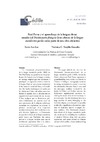Identificador persistente para citar o vincular este elemento:
https://accedacris.ulpgc.es/jspui/handle/10553/52573
| Título: | Paul Perny y el aprendizaje de la lengua china: estudio del Dictionnaire français-Latin-chinois de la langue mandarine parlée como parte de una obra didáctica | Otros títulos: | Paul Perny and the learning of the Chinese language: A study of his Dictionnaire français-Latin-chinois de la langue mandarine parlée as part of a whole teaching | Autores/as: | Lee-Lee, Xavier Trujillo-González, Verónica C. |
Clasificación UNESCO: | 57 Lingüística | Palabras clave: | Cultural approach French-Chinese lexicography Jesuit China mission Lexicographie franco-chinoise Approche culturelle, et al. |
Fecha de publicación: | 2016 | Publicación seriada: | Çédille | Resumen: | Le Dictionnaire français-latin-chinois de la langue mandarine parlée (1869) du Père Paul Perny est, parmi les œuvres plurilingues du français avec la langue chinoise, un ouvrage original qui vise clairement à privilégier une approche communicative de la langue. Dans cet article nous montrerons le lien entre le travail de Perny et la tradition des études sinologiques entreprise par les jésuites en Chine ; de même, nous étudierons la manière dont le dictionnaire est organisé ainsi que la nature de son lexique. Il faut souligner que ce dictionnaire présente évidemment un nombre élevé de mots provenants de la religion catholique, cependant on a également pu constater la présence systématique d'un important nombre de mots issus de la tradition culturelle chinoise. Également, le Dictionnaire français-latin-chinois de la langue mandarine parlée ressort par l'inclusion des termes propres à la langue courante ainsi que de nombreuses expressions liées à la culture chinoise. Il présente en outre, toute une série de mots qui nous permettent de nous rapprocher de l'univers culturel chinois. This paper defends the idea that the Dictionnaire français-Latin-chinois de la langue mandarine parlée (1869), written by French clergyman Paul Perny, represents a groundbreaking work within the French to Chinese multilingual lexicography based on its strong communicative stance. It outlines the relationship between Perny's work and the sinological tradition initiated by the Jesuits in China, and further analyzes the dictionary's organizational structure, including the nature of its lexical inventory. It is noteworthy that this dictionary features a large number of terms belonging to the Catholic religion, even though it is possible to identify a significant and systematic presence of vocabulary specific to pagan Chinese tradition. The Dictionnaire françaisLatin-chinois de la langue mandarine parlée also stands out for including the vocabulary of modern Chinese along with numerous expressions and terms related to Chinese culture which enable a closer understanding of the Chinese cultural universe. |
URI: | https://accedacris.ulpgc.es/handle/10553/52573 | ISSN: | 1699-4949 | Fuente: | Cedille [ISSN 1699-4949], n. 12, p. 205-222 |
| Colección: | Artículos |
Visitas
58
actualizado el 10-ene-2026
Descargas
80
actualizado el 10-ene-2026
Google ScholarTM
Verifica
Comparte
Exporta metadatos
Los elementos en ULPGC accedaCRIS están protegidos por derechos de autor con todos los derechos reservados, a menos que se indique lo contrario.
